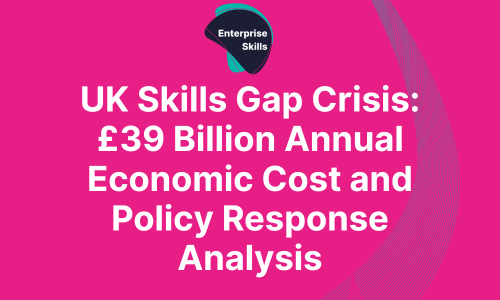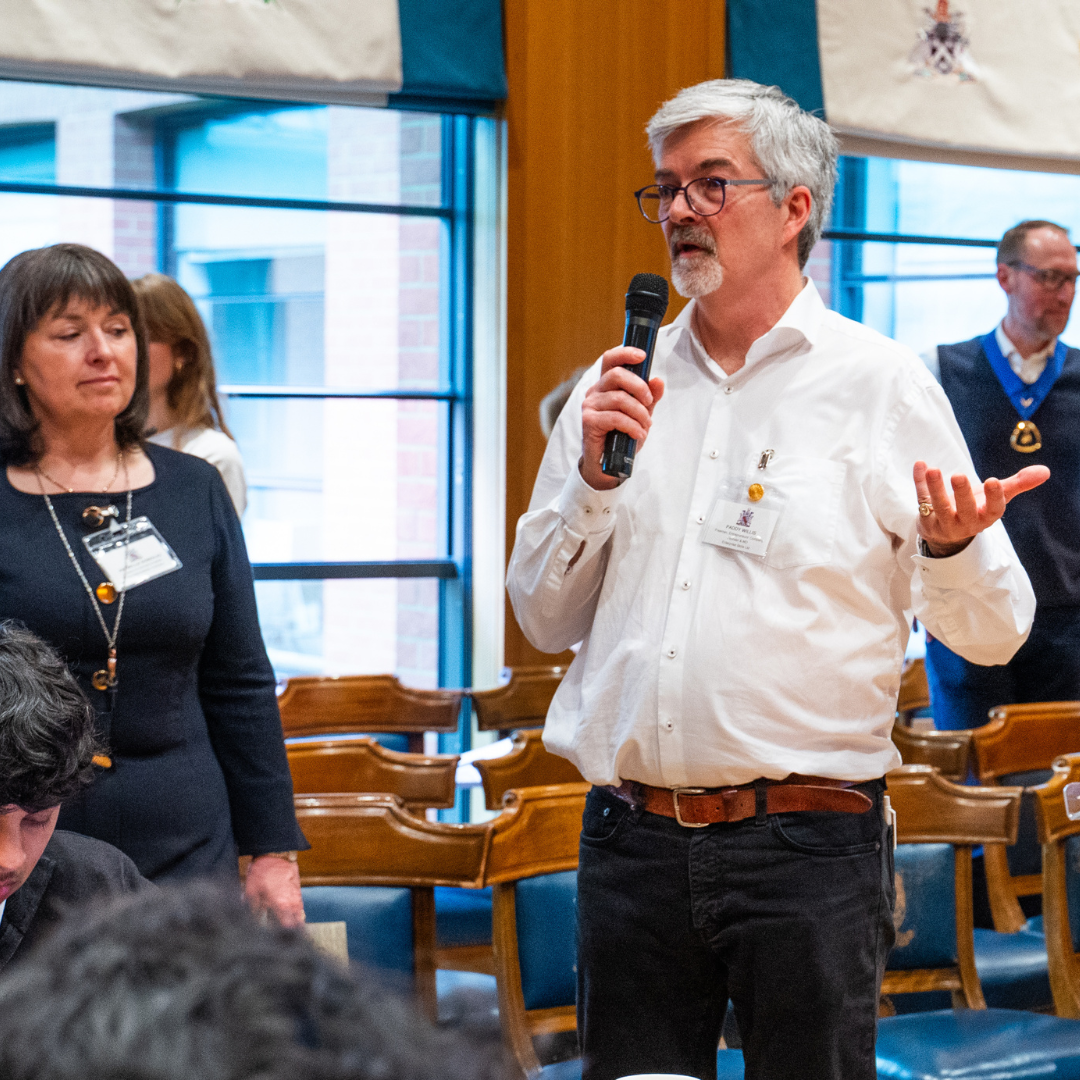The £22 Billion Solution Already Working in 82 Schools
While this research identifies commercial awareness as a critical component of the £22-88 billion soft skills gap, Enterprise Skills is already addressing it at scale. Our platform delivers 73% better comprehension than traditional methods by combining real-world business simulations with curriculum-mapped tools.
We’re not waiting for policy change – we’re building commercially aware, career-ready students today.
Learn How We’re Closing the Skills Gap →The UK skills shortage costs between £30-39 billion annually in lost GDP and productivity, with projections reaching £120 billion by 2030 if unaddressed. This represents a 1.2-1.6% fall in economic output equivalent to the entire UK defence budget. The crisis stems from a perfect storm: 2.5 million highly skilled workers will be needed by 2030, yet government skills spending has fallen £1 billion below 2010 levels in real terms, and employer training investment per employee has dropped 29.5% since 2011. The most severe gaps are in digital skills (£63 billion annual cost), essential soft skills including commercial awareness (£22 billion annually), and workplace readiness, yet specific data on graduate retraining costs and commercial awareness deficits remain frustratingly elusive, typically embedded within broader skills mismatch figures rather than quantified separately.
Digital Skills Shortage Bleeds £63 Billion Yearly from UK Economy
The digital skills gap represents the single largest quantified skills deficit, costing the UK economy £63 billion per year in lost potential GDP according to House of Commons Science and Technology Committee findings cited continuously by government departments through 2024. This staggering figure reflects a workforce fundamentally unprepared for modern economic demands: 7.5 million UK adults (18% of the adult population) lack essential digital skills needed for workplace participation, and over 80% of current job vacancies require at least one digital competency.
The trajectory worsens significantly without intervention. By 2030, WorldSkills UK projects the digital skills gap will balloon to £166 billion in annual GDP losses, representing a 0.5% drag on economic growth every year. University of Birmingham research offers a more conservative but still alarming projection: digital skills shortages currently costing £4.4 billion in 2023 will escalate to £27.6 billion by 2030, putting 380,000 full-time equivalent jobs at risk. Professional and associate professional roles face the steepest cliff, with projected losses of 69,000 and 60,000 FTE positions respectively.
Consulting firm Accenture calculated that failure to address digital capability gaps could forfeit £141.5 billion of GDP growth promised by intelligent technologies over the next decade. The paradox is stark: 51% of UK workers’ time could be augmented by technology and 37% could be automated, yet the workforce lacks the skills to capitalise on these productivity gains. Conversely, addressing these deficits unlocks enormous opportunity. Accenture estimates the UK could gain an additional £736 billion above baseline from generative AI by 2038 if organisations adopt people-centric approaches prioritising workforce skills development.
Soft Skills Deficit Including Commercial Awareness Costs £22 Billion Annually
Essential soft skills, encompassing communication, problem-solving, teamwork, leadership, and critically, commercial awareness cost the UK economy £22 billion annually according to 2023 joint research by CIPD, KPMG, and Edge Foundation. This figure captures the economic impact of 51% of the UK workforce missing opportunities to develop these transferable capabilities. The research revealed that 92% of employees consider soft skills essential for career progression, yet systematic development opportunities remain scarce.
An earlier baseline study commissioned by McDonald’s and prepared by Development Economics calculated the broader soft skills gap at £88 billion to the UK economy, a figure still widely cited across government and industry reports through 2024. This research, examining six key soft skill clusters including commercial awareness, found that 97% of UK employers believe soft skills are critical to business success, while 75% acknowledge an existing workforce gap. The study projected this would reach £109 billion per annum by 2020 if trends continued, with a combined shortage and gap cost of £8.4 billion annually concentrated in accommodation/food services, retail, health/social work, manufacturing, and business administration sectors.
The commercial awareness gap specifically lacks discrete quantification in authoritative sources. Despite being consistently identified by graduate recruiters as one of the most critical deficiencies in new hires, commercial awareness appears only as an embedded component within broader soft skills or employability skills measurements. This absence of separate costing represents a significant gap in the evidence base—employers universally cite lack of business acumen and commercial understanding as barriers to graduate productivity, yet no major research body has isolated its specific economic cost. The £22 billion soft skills figure and £88 billion broader estimate serve as the closest available proxies, as both explicitly include commercial awareness within their skill cluster definitions.
Employers Bear £6.1 Billion Annually to Compensate for Skills Shortages
Skills shortages impose direct financial burdens on UK businesses totaling £6.1 billion per year in recruitment fees, inflated salaries, temporary staff costs, and training expenditures to upskill lower-level hires according to Open University research. A separate 2023 Business Barometer calculation placed annual costs at £6.6 billion in lost productivity and recruitment expenses. UK companies delivered 29 million hours of training at a cost of £1.3 billion in 2023 specifically to address talent shortages, representing an attempted but insufficient response to capability gaps.
The June 2024 British Chambers of Commerce Business Barometer revealed 62% of organisations experiencing skills shortages (down slightly from 73% in 2023), with cascading operational impacts: 68% report increased workload on existing staff, 49% face reduced activity or output, 38% suffer decreased profitability, 34% see diminished staff morale and wellbeing, and 33% have scaled back long-term growth and investment plans. The CBI’s October 2023 Employment Trends Survey found 71% of businesses hit by labour shortages in the past 12 months, with 38% unable to respond to new business opportunities, 22% holding back investment in other business areas, and 12% forced to shrink operations entirely.
Total UK employer training expenditure tells a troubling story of declining investment. Department for Education official statistics show training spending fell from £59.0 billion in 2022 to £53.0 billion in 2024 (in 2024 prices)—an 18.5% decrease since 2011. Per-employee investment dropped even more sharply: from £1,960 in 2022 to £1,700 in 2024, representing a 29.5% decline per worker since 2011. This withdrawal of employer investment in workforce capability directly exacerbates the skills gaps imposing billions in costs on these same businesses—a counterproductive cycle driven by short-term financial pressures and inadequate incentive structures.
Graduate Skills Mismatch Reaches 37%, Highest Among OECD Nations
The UK faces the highest graduate skills mismatch rate in the OECD, with 37% of UK graduates overqualified for their roles employed in non-graduate jobs or positions mismatched to their qualifications according to 2024 OECD analysis. This 30-37% mismatch rate represents massive squandered investment in higher education and enormous productivity losses. Horizontally mismatched graduates earn 1.5% less than matched peers, while high-skilled workers in wrong roles face a 19.6% wage penalty, and those in low-skilled occupations suffer a devastating 38.7% earnings reduction. Over time, these penalties compound into significant lifetime earnings gaps.
Social Mobility Foundation research quantified class-based earnings disparities that illuminate workplace readiness deficits: people with working-class origins face an average pay gap of £6,718 annually (13.05%) across all occupations, effectively working one in every seven days for free. In elite professions, gaps widen dramatically: CEOs face a £16,749 annual gap, finance managers £11,427, management consultants £8,863, solicitors £8,115, and accountants £6,261. These disparities reflect not just educational differences but deficits in soft skills, commercial awareness, professional networks, and cultural capital precisely the employability competencies that research shows cost the economy tens of billions annually.
The absence of specific graduate retraining cost figures represents another evidence gap. While Big Four consulting firms invest £21,000-£45,000 in graduate salaries alone over three-year programs, plus professional qualification training costs of £2,000-£7,500 depending on level, no major study has isolated the additional cost burden of remedying commercial awareness or workplace readiness deficits specifically. This training investment is substantial. Open University research calculated upskilling existing employees saves businesses £36,084 per employee compared to replacement hiring, demonstrating the scale of recruitment and onboarding costs, yet the proportion attributable to bridging educational gaps versus normal professional development remains unquantified.
Government Retreats on Skills Investment as Crisis Deepens
Government spending on skills in England stands £1 billion lower in 2025 than in 2010 in real terms according to Learning and Work Institute analysis, cited extensively in Parliamentary evidence and policy documents. The Institute for Fiscal Studies calculated adult education and apprenticeship funding has declined 23-25% in real terms over this period, representing a 28% per capita reduction in adult skills funding. This systematic withdrawal of public investment coincides with the period when skills shortages have doubled: skills-shortage vacancies reached 531,200 in 2022, up from 265,000 in 2017, with the proportion of hard-to-fill vacancies due to skills deficits rising from 22% to 36% of all openings.
The £1 billion funding reduction has direct human consequences. Adult learner participation in government-funded further education collapsed from 3.2 million in 2010/11 to 1.6 million in 2020/21, a 48% decline according to National Audit Office analysis. The government’s Skills Index, measuring the further education system’s impact on productivity, fell 46% from 2012/13 to 2020/21. Current spending includes £3.9 billion on adult education, apprenticeships, and other skills programs (2021-22 figure), with the Adult Skills Fund allocated £1.4 billion for 2025/26. The October 2024 Spending Review announced £1.2 billion annually for 16-18 year-old skills and training, alongside £700 million for 2024-25 teacher recruitment and retention initiatives across secondary and further education.
These investments, while significant in absolute terms, fail to match the scale of economic costs imposed by skills deficits. When digital skills gaps alone cost £63 billion annually and overall labour shortages impose £39 billion in annual economic drag, public investment of £3-4 billion appears dramatically insufficient. PwC’s July 2024 Framework for Growth analysis calculated that addressing skills, education, and talent gaps could deliver a £230 billion GVA uplift by 2035, part of a potential £650 billion total economic gain from improving growth enablers. The research, based on 60 senior business leader interviews and a 1,200-business survey, found 53% of firms rank skills, education and talent in their top three growth components yet chronic underinvestment persists.
Quantified Crisis with Unquantified Critical Components
The UK skills gap imposes documented costs of £30-39 billion annually in immediate economic losses, escalating to £120 billion by 2030 without intervention, with digital deficits alone accounting for £63 billion yearly and soft skills shortages including commercial awareness costing £22 billion. Employers shoulder £6.1-6.6 billion in direct costs while government investment has fallen £1 billion below 2010 levels in real terms. These figures, drawn from CBI, Learning and Work Institute, Edge Foundation, government departments, and major consulting firms between 2022-2025, establish the aggregate economic burden with reasonable precision.
Yet the most operationally significant cost elements—the specific expense of graduate retraining to address commercial awareness deficits, the isolated impact of business acumen gaps, and the discrete cost of remedying workplace readiness shortfalls remain unquantified in authoritative research. Commercial awareness appears consistently as an embedded component within £22-88 billion soft skills estimates rather than as a standalone figure. This measurement gap itself represents a policy failure: what gets measured gets managed, and the absence of granular costing for specific competency deficits obscures accountability and prevents targeted intervention.
The mathematics are unforgiving. The UK faces a projected shortfall of 2.5 million highly skilled workers by 2030, surpluses of 6.2 million low-skilled and 1.9 million intermediate-skilled workers, 37% graduate-job mismatch (highest in the OECD), and training investment per employee down 29.5% since 2011. Addressing these structural failures could unlock £230 billion in GVA gains by 2035 and £736 billion from generative AI by 2038. The question is not whether the UK can afford to invest in closing skills gaps, at £39 billion annually, it cannot afford not to, but whether political economy and institutional capacity exist to reverse fifteen years of declining skills investment and restore the workforce capabilities a modern economy requires.





